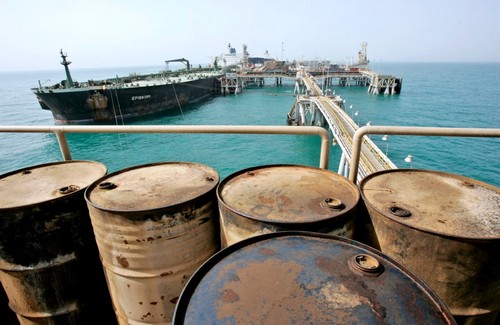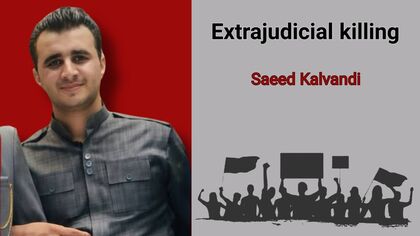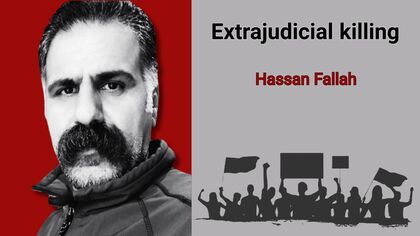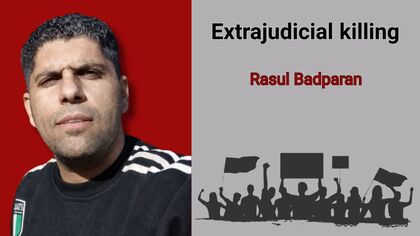Kenya cancels oil deal with Iran after warnings
16:17 - 6 July 2012

KURDPA: Kenya on Wednesday cancelled a deal to import Iranian oil hours after the U.S. warned the country that it risked being penalized if it sees through the deal which would breach U.S. and European union sanctions, a government official said.
The sanctions are meant to deprive funding for the Iranian government and what is believed to be an effort by Iran to build nuclear weapons.
Kenya\'s Energy Permanent Secretary Patrick Nyoike said Kenya had not signed an agreement but had a memorandum of understanding with Iran to import its oil and was complying with international sanctions on Iran.
\"There is an embargo on Iranian oil and on that note it has been decided that the M.O.U. will be terminated,\" Nyoike said.
The U.S. announced in December that it would penalize banks that do oil deals with Iran, giving countries and the oil markets until the end of June to adjust.
A statement from the U.S. State Department said Wednesday that sanctions will be implemented fully, and they include sanctions against financial institutions from any country, without an exception, if they are found to conduct sanctionable transactions, including those with the Central Bank of Iran.
Nyoike had been quoted this week saying that Kenya has signed an agreement to buy millions of barrels of Iranian oil.
He said he was not aware of the U.S. warning to Kenya about oil deals with Iran.
Nyoike said the cancellation of the memorandum with Iran had nothing to do with accusations that two men believed to be agents of a secretive unit in the Iranian armed forces were planning to bomb American, Israeli, British and Saudi Arabian targets.
Kenyan security forces arrested the Iranians on June 19 and were then led to 15 kilograms (33 pounds) of RDX, a powerful explosive that could have been used against multiple targets or concentrated in one large bomb. If used together, the explosives could have leveled a medium-sized hotel, officials told AP.
The two suspects - Ahmad Abolfathi Mohammad and Sayed Mansour Mousavi - appeared in a Kenyan court last week, where Mohammad said he had been interrogated by Israeli agents. Israel\'s embassy said it had no comment.
In Israel, the office of Prime Minister Benjamin Netanyahu told the AP that \"there are no limits to the Iranian terror.\"
The U.S., which does not purchase Iranian oil, announced sanctions in December that would prohibit the world\'s banks from completing oil transactions with Iranian banks. That would make it more difficult for Iran to sell its crude on the open market. The oil in a single tanker can be worth $100 million. The U.S. sanctions took effect on June 28.
Europe announced in January it would prohibit imports of Iranian crude by July 1. It had been satisfying about 3 percent of its demand with oil from Iran. Europe also is prohibiting firms from insuring shipments of Iranian oil.
In recent years, Iran has exported 2.5 million barrels of oil per day, about 3 percent of world supplies. About 500,000 barrels have gone to Europe and most of the rest to China, India, Japan and South Korea.
Iranian fields produce a type of oil known as heavy, sour crude. This is a common type of crude that contains more sulfur than so-called light, sweet crude. Heavy crudes are harder and more expensive to refine into valuable fuels such as gasoline and therefore generally command a lower price.
The sanctions are meant to deprive funding for the Iranian government and what is believed to be an effort by Iran to build nuclear weapons.
Kenya\'s Energy Permanent Secretary Patrick Nyoike said Kenya had not signed an agreement but had a memorandum of understanding with Iran to import its oil and was complying with international sanctions on Iran.
\"There is an embargo on Iranian oil and on that note it has been decided that the M.O.U. will be terminated,\" Nyoike said.
The U.S. announced in December that it would penalize banks that do oil deals with Iran, giving countries and the oil markets until the end of June to adjust.
A statement from the U.S. State Department said Wednesday that sanctions will be implemented fully, and they include sanctions against financial institutions from any country, without an exception, if they are found to conduct sanctionable transactions, including those with the Central Bank of Iran.
Nyoike had been quoted this week saying that Kenya has signed an agreement to buy millions of barrels of Iranian oil.
He said he was not aware of the U.S. warning to Kenya about oil deals with Iran.
Nyoike said the cancellation of the memorandum with Iran had nothing to do with accusations that two men believed to be agents of a secretive unit in the Iranian armed forces were planning to bomb American, Israeli, British and Saudi Arabian targets.
Kenyan security forces arrested the Iranians on June 19 and were then led to 15 kilograms (33 pounds) of RDX, a powerful explosive that could have been used against multiple targets or concentrated in one large bomb. If used together, the explosives could have leveled a medium-sized hotel, officials told AP.
The two suspects - Ahmad Abolfathi Mohammad and Sayed Mansour Mousavi - appeared in a Kenyan court last week, where Mohammad said he had been interrogated by Israeli agents. Israel\'s embassy said it had no comment.
In Israel, the office of Prime Minister Benjamin Netanyahu told the AP that \"there are no limits to the Iranian terror.\"
The U.S., which does not purchase Iranian oil, announced sanctions in December that would prohibit the world\'s banks from completing oil transactions with Iranian banks. That would make it more difficult for Iran to sell its crude on the open market. The oil in a single tanker can be worth $100 million. The U.S. sanctions took effect on June 28.
Europe announced in January it would prohibit imports of Iranian crude by July 1. It had been satisfying about 3 percent of its demand with oil from Iran. Europe also is prohibiting firms from insuring shipments of Iranian oil.
In recent years, Iran has exported 2.5 million barrels of oil per day, about 3 percent of world supplies. About 500,000 barrels have gone to Europe and most of the rest to China, India, Japan and South Korea.
Iranian fields produce a type of oil known as heavy, sour crude. This is a common type of crude that contains more sulfur than so-called light, sweet crude. Heavy crudes are harder and more expensive to refine into valuable fuels such as gasoline and therefore generally command a lower price.



